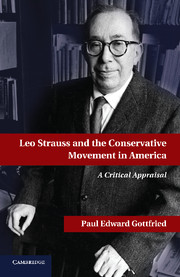2 - A Significant Life
Published online by Cambridge University Press: 05 January 2012
Summary
A Jew in Exile
Among the defining aspects of Leo Strauss’s early life, three seem to stand out: that he was born a Jew, in Germany, at the end of the nineteenth century. Strauss’s being born to Jewish parents in Germany in 1899 may tell more about the rest of his earthly existence than would other biographical details – for example, that he was born in the village of Kirchhain, in the Prussian administrative province of Hesse-Nassau, that his father, Hugo Strauss, operated a livestock and farm supply business with Leo’s uncle, or that his mother Jennie’s maiden name was David. Most biographical sketches of Strauss indicate that his family were conventionally but not zealously orthodox Jews. In his youth he was sent to the local Volksschule and later to the Gymnasium Philippinum, which was a preparatory school for the University of Marburg, an institution that had been founded in 1527 by Philip of Hesse, one of the early champions of the Protestant Reformation and a protector of Martin Luther.
From 1912 until his graduation from the Philippsuniversität in 1917, Leo boarded at Marburg with the local cantor and, in this setting, came into contact with the students of the Jewish neo-Kantian philosopher (1842–1918) Hermann Cohen. A celebrated professor at Marburg, Cohen was then defining Jewish religious practice in a way that fitted Kant’s notion of a rationally based ethic. Harmonizing an inherited legal tradition with a rationalist ethical system was a task of some importance for Jewish neo-Kantians in the early twentieth century. But Cohen also engaged other projects. His extensive study of Maimonides was partly as an attempt to find a distinguished Jewish precursor for his ethically based religion. Perhaps even more relevant for Strauss, Cohen linked Maimonides to the Muslim scholar Averroes (1126–1198), who first enunciated the concept of the double truth in his commentaries on Aristotle. Cohen – and later Strauss – took from Averroes the notion that philosophy and religion teach seemingly incompatible truths that could only be reconciled in God’s mind. And although Strauss did not appropriate Cohen’s Kantian theory of knowledge, he did espouse a “classical rationalist” approach to philosophy, a mode of thinking that was not alien to Cohen’s work.
- Type
- Chapter
- Information
- Leo Strauss and the Conservative Movement in America , pp. 11 - 37Publisher: Cambridge University PressPrint publication year: 2011



